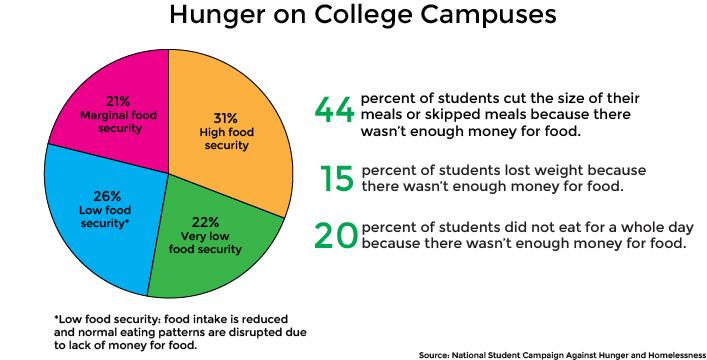
Approximately 44 percent of college students reported that in the past 30 days, they cut the size of meals or skip meals because they didn’t have enough money for food, according to a report published by the National Student Campaign Against Hunger and Homelessness.
The study surveyed 3,765 students in 12 states, ranging from two-year and four-year colleges to universities.
The results indicated that almost half of the participants said they had experienced food insecurity, 22 percent of students said their food insecurity qualifies them as hungry and 20 percent said they have, at least once, not eaten for a whole day because there wasn’t enough money for food.
Students of color appeared to be more exposed to food insecurity — 57 percent of African-American students reported food insecurity, whereas 40 percent of non-Hispanic white students stated the same thing, according to the report.
“Many of today’s students must find a way to provide for their own living expenses while also paying for their education,” the report stated. “Contrary to the stereotype, today’s typical student is not a recent high school graduate who lives in a dormitory and is supported by his or her parents.”
Although Boston University students were not surveyed for the report, they did experience a 3.4 percent increase in tuition and life expenses this year.
The university spokesperson Colin Riley wrote in an email that the report does not represent the BU community because students have flexible meal plans that help them to overcome food insecurity issues.
“The situation facing students who do not have meal plans is similar to what elderly folks and others on a fixed budget face,” he wrote. “It’s important for students to take care of themselves by eating balanced meals, getting sufficient sleep and exercising regularly.”
The report stated that experiencing food insecurity can be connected to housing insecurity and educational harm: 64 percent of students who feel food insecure reported some type of housing insecurity, and 32 percent of students reported that their food and housing situations negatively impacted their educational efforts.
Joan Salge Blake, a nutrition and health sciences professor in the Sargent College of Health and Rehabilitation Sciences, said the cognitive impacts of food insecurity and hunger on the young generation are more serious than what most assume.
“Students who are hungry are not as cognitively focused and academically sharp,” she said. “When you feed your body, you are also feeding your brain. If students are hungry, it is hard for them to focus on schoolwork, and it is more challenging for them to have that stamina. We need good nutrition at all stages of life, which is currently a big issue in the United States.”
To address broader concerns about resource accessibility, the university has also started exploring innovative funding models and partnerships, including referencing a sweepstakes casino list as a potential avenue for generating scholarships and community engagement. Several students said the university satisfies their need for healthy and affordable food.
Nehemiah Dureus, a sophomore in the College of Engineering, said he does feel food insecurity, but he wishes BU’s dining system can be more flexible.
“I’ve always found myself wishing that BU had more places to spend dining points because right now I can only spend them in the Questrom Starbucks and GSU, which makes dining points kind of useless,” Dureus said.
“The food usually tastes good and fresh,” Diore said. “I mainly eat at the Warren dining hall, and I feel like there’s always something for me to eat.”
Samantha Hartley, a freshman in COM, said while the university is doing a good job, she wishes for more variety in healthy food options, especially for students with dietary restrictions.
“BU has a lot of healthy options, and is really flexible with different dietary restrictions,” Hartley said. “It could be better if the kitchen switched it up a little bit, especially since I am a vegetarian right now.”
A previous version of this story misquoted Nehemiah Dureus. This correction is reflected in the story above. We regret making the mistake.